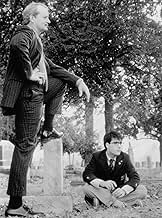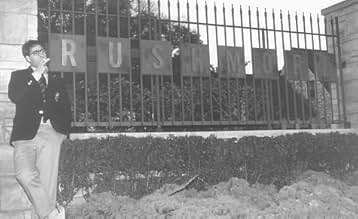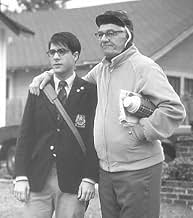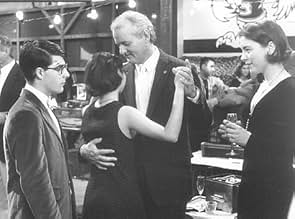Il re delle attività extracurriculari del liceo Rushmore viene messo alla prova sui suoi profitti scolastici.Il re delle attività extracurriculari del liceo Rushmore viene messo alla prova sui suoi profitti scolastici.Il re delle attività extracurriculari del liceo Rushmore viene messo alla prova sui suoi profitti scolastici.
- Regia
- Sceneggiatura
- Star
- Premi
- 16 vittorie e 16 candidature totali
Dipak Pallana
- Mr. Adams
- (as Deepak Pallana)
Recensioni in evidenza
10DaniVT88
Wes Anderson's Rushmore is a movie full of everything that modern day cinematic crap movies lack; dry humor, unique writing, music that makes a scene unforgettable, and real heart. I feel as though Rushmore is cinematic excellence, Max Fischer is the perfectly flawed yet absolutely brilliant character who tries to find his place in the world, whether it's by engrossing himself in extracurricular activities or pretending he's the son of a neurosurgeon. All of the characters are finely tuned, Herman Blume is a successful man who feels worthless, Miss Cross is a brilliant woman who feels only sorrow because of the loss of her husband. But it is their flaws that make them so wonderful, they aren't boxed into labeled packages, they are raw and real human beings who are just trying to survive. This movie is about, as Max says, finding out what you love and doing it for the rest of your life.
The camera angles in this film are interesting, connecting you to the environment and the characters. Wes Anderson picks the perfect music for each scene, especially for the heartbreaking scene at the end when Miss Cross and Max are dancing to the Faces "Ooh la la." But, what's most brilliant about Rushmore is how it makes you feel; pessimistic yet hopeful, sad yet joyful, confused yet clear-minded. A good movie makes you think but a great movie changes your perspective on the world and this is what Anderson has done. To quote Cousteau, as Miss Cross did in the Diving for Sunken Treasure book, "When one man, for whatever reason, has the opportunity to lead an extraordinary life he has no right to keep it to himself," and I'm glad that Wes Anderson created such an extraordinary movie and shared it with us all.
The camera angles in this film are interesting, connecting you to the environment and the characters. Wes Anderson picks the perfect music for each scene, especially for the heartbreaking scene at the end when Miss Cross and Max are dancing to the Faces "Ooh la la." But, what's most brilliant about Rushmore is how it makes you feel; pessimistic yet hopeful, sad yet joyful, confused yet clear-minded. A good movie makes you think but a great movie changes your perspective on the world and this is what Anderson has done. To quote Cousteau, as Miss Cross did in the Diving for Sunken Treasure book, "When one man, for whatever reason, has the opportunity to lead an extraordinary life he has no right to keep it to himself," and I'm glad that Wes Anderson created such an extraordinary movie and shared it with us all.
10mcnally
I think if you're looking for a straight up comedy, you'll be disappointed. This is not an easily classifiable film, but one that I love for its unique spin on some interesting characters. I especially like the fact that Max is not completely lovable, but in the end you root for him anyway. I found all the various reconciliations quite touching, and there's an interesting emphasis on friendships between people with lots of differences. Max's sidekick is younger than him, his crush is on a teacher much older, his friendship with Bill Murray's character who could be his father. Lots of heart here.
As I watched this film, I couldn't help but find brief and twisted similarities between Max Fischer's school days and that of Edward Albee of 'Who's Afraid of Virgina Woofe' fame. Before you laugh let me explain:
Max recieved a scholarship for a play written in childhood, showed significant reluctance to follow the curriculum, and rather chose to pursue his own interests, especially play writing.
Edward Albee, in most of his biographical information, comments on his difficulities in school, and dropping out of college after about a year and a half, to focus on his writing. Further, Albee's work became recognized at the early age of thirteen when he wrote 'The Zoo Story'.
Max was not from the wealthy family as Albee was. Although, the greater than $10,000,000, Herman Blume, (dissatisfied with the conventional, insensitive , sterotypical jock, twins of his own) "abopts" Max as a surrogate son.
The father of Max was reminiscent of Thorton Wilder who encouraged Albee to follow his instincts and become a play write.
As we leave Max he has written his successful work 'Heaven & Hell', his stage production of 'Apocalypse Now'. At this point in time, this is Max's theatrical master piece, his 'Who's Afraid of Virgina Woolfe', if you will.
Also, don't forget the name of Miss Cook's deceased Edward Appleby...
Now, for those of you who have never been mistaken in reading the undertone of a movie, cast the first stone. I would welcome the comments. For those of you few that may agree, please let me know, possibly there are more correlations.
.
Max recieved a scholarship for a play written in childhood, showed significant reluctance to follow the curriculum, and rather chose to pursue his own interests, especially play writing.
Edward Albee, in most of his biographical information, comments on his difficulities in school, and dropping out of college after about a year and a half, to focus on his writing. Further, Albee's work became recognized at the early age of thirteen when he wrote 'The Zoo Story'.
Max was not from the wealthy family as Albee was. Although, the greater than $10,000,000, Herman Blume, (dissatisfied with the conventional, insensitive , sterotypical jock, twins of his own) "abopts" Max as a surrogate son.
The father of Max was reminiscent of Thorton Wilder who encouraged Albee to follow his instincts and become a play write.
As we leave Max he has written his successful work 'Heaven & Hell', his stage production of 'Apocalypse Now'. At this point in time, this is Max's theatrical master piece, his 'Who's Afraid of Virgina Woolfe', if you will.
Also, don't forget the name of Miss Cook's deceased Edward Appleby...
Now, for those of you who have never been mistaken in reading the undertone of a movie, cast the first stone. I would welcome the comments. For those of you few that may agree, please let me know, possibly there are more correlations.
.
Rushmore was the first Wes Anderson film I saw, and I didn't think much of it the first time. I used to think that Royal Tenenbaums was Anderson's first good film. I thought Bottle Rocket wore its rookie status on its sleeve; I thought Rushmore was flawed; and I thought Tenenbaums finally showed that Anderson had honed his craft and he would start making great films. I then re-watched Tenenbaums and found it to be even more satisfying on additional viewings. I realized that Anderson had actually crafted one of those rare pieces of cinema that reveals itself more and more upon repeat viewings. So I of course decided to give Rushmore a second look.
Now that I've had a chance to see the DVD, I've had a much different experience viewing the film. Perhaps because I saw it on Pan and Scan VHS previously? Or perhaps because Anderson's vision requires an adjustment period?
Some people will never like Anderson's films. They simply will not appeal to those out there who want clichéd Hollywood fodder. Some people will love Anderson's films from the moment they see them. Others, like myself, will need to see the films more than once to truly appreciate them. Anderson breaks convention in ways no one has done before - One has to understand that his films are deep where most films are shallow, and shallow where most films are deep. This will throw A LOT of people off, as evidenced by many of the comments on the message boards. Anderson's films begin where others end. In Rushmore, we see Max's fall from grace, not his climb up to become head of every club in his school. In Tenenbaums, we see the aftermath of the child prodigies, not their glory years. Again, this will throw a lot of people off, and indeed I heard this criticism of Tenenbaums quite a lot. Anderson constructs the world of his films around a cinema storybook. They are episodic, told in chapters. Some will find Anderson at first glance to be a rather egotistical filmmaker, as I once did. However, upon second glance, you can begin to see the rich text woven deeper in the films that might be hidden beneath quirkiness or drastic breaks from convention. The first time I saw Rushmore, I felt shock, embarrassment and confusion (Mostly at Max and Rosemary's bizarre interaction). I was lost and unfamiliar with this world Anderson has created. The second time I saw the film I felt Passion, Love, Tragedy and ultimate Redemption. I found the heart in Anderson's film.
If you felt Rushmore was not all it could have been the first time you saw it, please give it another chance. You'll find which side you fall on.
Now that I've had a chance to see the DVD, I've had a much different experience viewing the film. Perhaps because I saw it on Pan and Scan VHS previously? Or perhaps because Anderson's vision requires an adjustment period?
Some people will never like Anderson's films. They simply will not appeal to those out there who want clichéd Hollywood fodder. Some people will love Anderson's films from the moment they see them. Others, like myself, will need to see the films more than once to truly appreciate them. Anderson breaks convention in ways no one has done before - One has to understand that his films are deep where most films are shallow, and shallow where most films are deep. This will throw A LOT of people off, as evidenced by many of the comments on the message boards. Anderson's films begin where others end. In Rushmore, we see Max's fall from grace, not his climb up to become head of every club in his school. In Tenenbaums, we see the aftermath of the child prodigies, not their glory years. Again, this will throw a lot of people off, and indeed I heard this criticism of Tenenbaums quite a lot. Anderson constructs the world of his films around a cinema storybook. They are episodic, told in chapters. Some will find Anderson at first glance to be a rather egotistical filmmaker, as I once did. However, upon second glance, you can begin to see the rich text woven deeper in the films that might be hidden beneath quirkiness or drastic breaks from convention. The first time I saw Rushmore, I felt shock, embarrassment and confusion (Mostly at Max and Rosemary's bizarre interaction). I was lost and unfamiliar with this world Anderson has created. The second time I saw the film I felt Passion, Love, Tragedy and ultimate Redemption. I found the heart in Anderson's film.
If you felt Rushmore was not all it could have been the first time you saw it, please give it another chance. You'll find which side you fall on.
Max Fischer has a scholarship to exclusive prep school Rushmore, despite the fact that he really isn't as smart as his demeanour would suggest. He relentlessly talks himself up, forms and joins clubs and seems to impress as many people as he annoys all with a very thin veil of lies to support it. When he falls in love with a teacher (Rosemary Cross) things appear wonderful but it is not long before he has messed it up. His frustrated friend (Herman Blume) tries to help but only succeeds in making things much, much worse and Max risks losing everything that is important to him.
Having recently see The Life Aquatic etc I decided to step back to a film that I feel did Wes Anderson's humour and talent much more of a service and one in which he got the mix just right. To me Rushmore is that film, although this is not to imply that it will appeal to those that just don't like any of his films. The plot is the usual mix of offbeat characters, strange events and deep seated emotions (and usually not happy ones either), it is quirky and humorous but it still works because, unlike Life Aquatic, it has enough heart and plot to balance out the dark quirky humour. To me the story is still a bit strange and difficult to get into but it does the hard work for you and even when I was still getting into it I was interested if not totally involved. The heart of the story is not one I could relate to, but I was able to feel for the characters and got into it quickly as a result none of them are instantly likable characters or simple ones but they are still well written and delivered. The humour is never really consistently hilarious but to complain about a lack of belly laughs is to miss the point; for me the dark humour was well done and I found the film funny even when it didn't draw laughs from me.
The cast are impressive and work well with the material they are given. Murray has much more meat in this supporting role than he did with Zissou and he does very good work with it throughout while also managing to carry off his deadpan delivery as well as usual. Schwartzman is spot on with a character that we are never able to truly like but have to get behind at the same time he pitches it just right and shows a great understanding of his character. Williams is beautiful and vulnerable and works well in her role while support is good from Cox and Cassel as well as several others in support roles and cameos. Special mention to Tanaka for being the sweetest redemption I've seen in many a film and pulls off the geeky but wonderful girl of many of our dreams.
Overall this is a good film but not one that will appeal to the majority of viewers or be the one to win over those that just don't like Wes Anderson's films. The plot and characters are interesting throughout and the film succeeds because it manages to mix emotional content with darkly quirky humour rather than doing one at the expense of the other. An enjoyable film and probably my favourite from Anderson thus far.
Having recently see The Life Aquatic etc I decided to step back to a film that I feel did Wes Anderson's humour and talent much more of a service and one in which he got the mix just right. To me Rushmore is that film, although this is not to imply that it will appeal to those that just don't like any of his films. The plot is the usual mix of offbeat characters, strange events and deep seated emotions (and usually not happy ones either), it is quirky and humorous but it still works because, unlike Life Aquatic, it has enough heart and plot to balance out the dark quirky humour. To me the story is still a bit strange and difficult to get into but it does the hard work for you and even when I was still getting into it I was interested if not totally involved. The heart of the story is not one I could relate to, but I was able to feel for the characters and got into it quickly as a result none of them are instantly likable characters or simple ones but they are still well written and delivered. The humour is never really consistently hilarious but to complain about a lack of belly laughs is to miss the point; for me the dark humour was well done and I found the film funny even when it didn't draw laughs from me.
The cast are impressive and work well with the material they are given. Murray has much more meat in this supporting role than he did with Zissou and he does very good work with it throughout while also managing to carry off his deadpan delivery as well as usual. Schwartzman is spot on with a character that we are never able to truly like but have to get behind at the same time he pitches it just right and shows a great understanding of his character. Williams is beautiful and vulnerable and works well in her role while support is good from Cox and Cassel as well as several others in support roles and cameos. Special mention to Tanaka for being the sweetest redemption I've seen in many a film and pulls off the geeky but wonderful girl of many of our dreams.
Overall this is a good film but not one that will appeal to the majority of viewers or be the one to win over those that just don't like Wes Anderson's films. The plot and characters are interesting throughout and the film succeeds because it manages to mix emotional content with darkly quirky humour rather than doing one at the expense of the other. An enjoyable film and probably my favourite from Anderson thus far.
Wes Anderson Films as Ranked by IMDb Rating
Lo sapevi?
- QuizJason Schwartzman came to his audition wearing a prep-school blazer which sported a Rushmore patch he had made himself.
- BlooperThe Swiss Army Knife Dirk gives Max says "Rushmore Yankee 1985-1997". Since Max is 15, this would mean he has gone to Rushmore since age three. But his first talk with Dr. Guggenheim reveals that he has only gone to Rushmore since second grade.
- Citazioni
Max Fischer: I like your nurse's uniform, guy.
Dr. Peter Flynn: These are O.R. scrubs.
Max Fischer: O, R they?
- ConnessioniFeatured in The 56th Annual Golden Globe Awards (1999)
- Colonne sonoreMaking Time
Written by Eddie Phillips (as Edwin Michael Phillips) and Kenneth George Pickett
Published by EMI Unart Catalog Inc. (BMI)
Performed by The Creation
Courtesy of Shel Talmy Productions
I più visti
Accedi per valutare e creare un elenco di titoli salvati per ottenere consigli personalizzati
24 Frames From Wes Anderson Films
24 Frames From Wes Anderson Films
Explore the memorable career of Wes Anderson through 24 stills from his movies.
- How long is Rushmore?Powered by Alexa
Dettagli
- Data di uscita
- Paese di origine
- Lingue
- Celebre anche come
- Tres son multitud
- Luoghi delle riprese
- Aziende produttrici
- Vedi altri crediti dell’azienda su IMDbPro
Botteghino
- Budget
- 9.000.000 USD (previsto)
- Lordo Stati Uniti e Canada
- 17.105.219 USD
- Fine settimana di apertura Stati Uniti e Canada
- 43.666 USD
- 13 dic 1998
- Lordo in tutto il mondo
- 17.198.495 USD
- Tempo di esecuzione1 ora 33 minuti
- Mix di suoni
- Proporzioni
- 2.39 : 1
Contribuisci a questa pagina
Suggerisci una modifica o aggiungi i contenuti mancanti



































